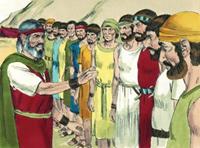Shelach 5774: Commandments, or Advice?
 Last November I wrote a blog post, “Does God Care if Women Wear Tefillin?” where I put forth the idea that God is a “big picture” sort of force, and all the details in the commandments (mitzvot), as interpreted by the rabbis, are really advice for us on how to align with that force. Unusually for me, that piece was written straight from the heart, without support from biblical or rabbinic texts. I also believe that the commandments are the Jewish path for connecting with God. There are many paths for connecting with God; Buddhists meditate; Jews do mitzvot. See my d’var Torah “Mishpatim 5770 — Take a Leap of Action” for more on that subject.
Last November I wrote a blog post, “Does God Care if Women Wear Tefillin?” where I put forth the idea that God is a “big picture” sort of force, and all the details in the commandments (mitzvot), as interpreted by the rabbis, are really advice for us on how to align with that force. Unusually for me, that piece was written straight from the heart, without support from biblical or rabbinic texts. I also believe that the commandments are the Jewish path for connecting with God. There are many paths for connecting with God; Buddhists meditate; Jews do mitzvot. See my d’var Torah “Mishpatim 5770 — Take a Leap of Action” for more on that subject.
I was pleasantly surprised when studying the Torah portion to find a Hasidic rebbe, the Slonimer Rebbe, making the same point.
In this week’s Torah portion, Shelach, we have the story of the spies. Moses sent out a leader from each of the twelve tribes to scout out the land of Israel. They come back after 40 days with a report on the greatness and beauty of the land. Ten of the twelve spies, however, say “but there are giants in the land and we’ll never be able to conquer them.” Despite the encouragement of the two “good spies,” Joshua and Kalev, the nation as a whole loses heart and starts complaining, saying “why did we ever leave Egypt?”
God punishes the people with 40 years of wandering in the desert – a year for each day the spies were gone. Not only that, it is decreed that the entire generation that was born and raised in Egypt would die in the desert without reaching the Promised Land.
There’s a principle in Judaism called midah k’neged midah, “measure for measure,” the punishment should fit the crime. While the number “40” appears in both the “sin” of the spies and their negative report and in the punishment meted out by God, 40 years for 40 days is hardly measure for measure. A little over the top, isn’t it?
The problem of disproportionate punishment occurs throughout the narrative of the Israelite’s time in the desert. In last week’s parsha the people complained about the food (the mannah provided by God). God gives them quail – but also sends a plague that kills over 14,000 people. WHOA! How is complaining about the food a capital offense?
In his commentary on last week’s parsha, Beha’alotcha, the Slonimer Rebbe points that neither the episode with the quail or the story in this week’s Torah reading about the spies are infractions that an earthly rabbinic court (beit din) would punish at all. They are not even considered “sins” in the strict sense of the word. So how can we understand the severe punishments from heaven for infractions that wouldn’t even be recognized as infractions by an earthly court?
The Slonimer derives an important general principle, a “foundational light” about the commandments:
…therefore, the purpose of the entire Torah and mitzvot is to cleave to God, and the commandments are advice to the Jew, that by way of them he can cleave to God, the 248 positive commandments are advice on obligatory matters that through their fulfillment you can draw close to God, and the 365 negative commandments are advice on things to avoid in order not to become distanced from God
And this relates to the sin of the generation in the desert. Their “sins” were sins that distanced them from God – their attitude damaged the essential faith in God that is the goal of the spiritual path. The Slonimer says faith is the foundation of Judaism, and without faith you’re not even part of “Clal Yisrael,” the Jewish people. Furthermore conducting ourselves with holiness, kedusha, is fundamental to Clal Yisrael. The generation in the desert lost faith, weren’t conducting themselves with holiness (and respect toward God) and therefor their punishment was dramatic.
This interpretation of the role of the commandments only makes sense to us today if we read the punishments metaphorically. The punishment for doing something that distances you from God surely cannot literally be death. It could, however, be a form of “spiritual death.” The more distant you become from God, the more “deadened” you are to God’s presence in the world. We don’t need to posit Heaven and Hell as a rationale for observing the commandments. The reward and punishment happens in this world: follow the commandments and you are rewarded with drawing close to God. Disobey the commandments, and your punishment is you are distant from God.
There is a little bit of a “chicken and egg” problem with observing the commandments – unless you’ve had at least a taste of feeling God’s presence through the commandments, why would you care? Many people today are so distant from God that they don’t even miss God. The spiritual pull to seek something transcendent has been wiped out by all the noise of the modern world for many people, and that’s a pity. That’s why for me Shabbat is the most essential commandment – the one thing you need to be on any kind of spiritual path is time unplugged from work and devices that suck your attention out of you.
